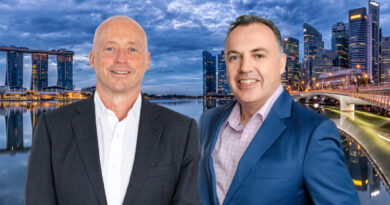Scott Treloar: “Investors’ capital ends up in the wrong places”
At Noviscient in Singapore, founder Scott Treloar is working on establishing a better investment management industry operating model. “The industry should really be changing from an approach of selling products based on returns to one of goal-based investing,” says Scott in a conversation with Hedge Funds Club’s Stefan Nilsson.
You’re a vocal critic of the status quo and same-old, same-old in the investment management industry. What drives you? Is it a case of right versus wrong?
The investment management industry is not very good at its job. It does not give its customers – retail investors to pension funds – good investment outcomes. Investors’ capital ends up in the wrong places: expensive funds, poorly performing funds, inappropriate funds, and paying way too much in fees for marketing and distribution. Why is this the case? Investment management is not customer-centric. Customers are seen as a resource, not as the purpose of the firm. The press has many articles about growth in AUM and fees, but no articles on how much value an investment firm has created for its customers. So, why am I working on this problem? Firstly, I’m not very good at being an insider and going along with the status quo. Eventually, the inefficiencies and misalignments drive me to the point where I need to try to change things. Secondly, I have happened to end up with an unusual set of qualifications and experiences and technical skills that are very appropriate for addressing this challenge. And finally, I just really dislike the unfairness of how the industry operates with respect to its customers.
Sophisticated professional investors can always find ways forward, but what about the Average Joe? What do you think, or hope, is the future for him and his neighbour Retail Rita?
Other than some of the more sophisticated allocators, most of the industry is operating under the wrong paradigm. Rather than engaging with investors to offer solutions based on identified goals and requirements, investors are sold products that offered the highest returns. So, rather than selling on the hope of high returns, the industry ought to develop the processes and technologies for interactively engaging with their customers to identify and deliver dynamic investment solutions. There is no reason this cannot be done on an increasingly granular scale to offer Joe and Rita solutions that meet their needs.
What will be the catalyst for change? Is it investor education that will start a revolution?
I know it sounds good, but it seems unlikely to me that education will solve the investment challenge. Investors need access to a broad set of products. They need to be able to distinguish that quality of the products. They then need to be able to construct and manage a dynamic portfolio of products to meet their financial goals and constraints. This is a difficult problem. What we do know is that the giant marketing and distribution machine that is the investment management industry is not working for investors. We are consistently getting terrible outcomes. I think change will come by showing investors a better way. By changing the basis of competition. Firms should not be successful because they spend more on marketing or they have locked in distribution arrangements. They should be successful by creating more value for their customers. And how fast will the industry change? To paraphrase Ernest Hemingway, “gradually, then suddenly.” Money can move quickly once it starts to move.
With retail investors now trading crypto and taking on equity risks they don’t necessarily understand, have we all forgotten about risk management and investor suitability? There seems to be a lot of talk about “democratising” investments, but little talk about investors getting access to, and advice on, investments that are appropriate for their risk understanding and tolerance.
We need to make a clear distinction between investing and trading. On the one hand, there is a lot of activity and noise about trading. We see this in Bitcoin and the meme stocks and apps like Robinhood. We also know that the vast majority of retail traders lose money. So, really this is more entertainment than an activity that will secure an investor’s financial future. On the other hand, we have investing. This involves a more deliberate and informed allocation of capital to a coherent portfolio of investments designed and dynamically adapted to meet an investor’s goals and constraints. Most investors need help to do this properly. To reiterate, the industry should really be changing from an approach of selling products based on returns to one of goal-based investing.
What’s your vision for Noviscient? Where do you want to take your firm in the long term?
We are building the world’s first virtual investment management firm. This is in the form of a system of integrated components focused on delivering value for investors, large and small. Specifically, this includes an open, digital platform that enables access to the best products from around the world. A goal-based investing portal that allows investors to define their needs based on probabilistic achievement of goals. A digitised operation model that enables frictionless creation and operation of customised investment solutions. We are not planning on confronting the industry. We will be bypassing it by seamlessly linking investors to sources of returns via a scalable and low-cost open platform. That is, reimagining a better industry operating model that puts its customers first by creating solutions that are increasingly instant, free and scalable.









